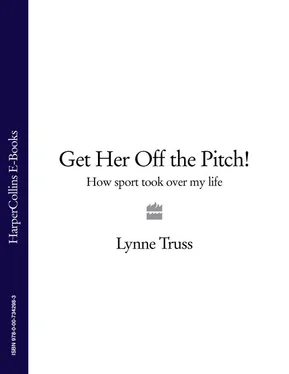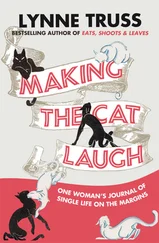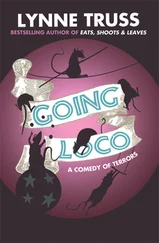All this occurred in my third year as a sports writer, and I apologise for starting, so bewilderingly, in the middle, but, as I hope this book will make clear, although I did the job for four years altogether, I felt bewildered and sort-of in the middle virtually all the time. I was permanently on an almost-vertical learning curve, clinging for life. For four years, week after week, at football stadiums, golf courses and race tracks, I would gaze around me - equipped with binoculars, pencil, notebook and enigmatic smile - and think, afresh, ‘Lynne, what the fuck are you doing here?’ Unfortunately, there was no point asking anyone else this question, because they couldn’t tell me. My colleagues in the press box, notably, were actually asking themselves the same question - i.e., ‘What the fuck is she doing here?’ - while inwardly snarling at the fact that this know-nothing middle-aged female (who sat chuckling over her laptop when she wasn’t complaining about the elbow-room or fainting for want of a half-time cheese roll) regularly deprived proper sports writers of prime space in a newspaper. I could genuinely sympathise with how irritating this was; but I did feel they should have been clever enough to work out that it wasn’t my fault, and that I’d never asked for this job; it had been someone else’s idea. However, I couldn’t deny how it looked. I had a very large byline picture featuring myself with a Louisville Slugger baseball bat. I sometimes wrote the whole back page of The Times . I had been nominated for Sports Writer of the Year. For someone who likes, above all, to be popular with colleagues and not attract undue disdain, I might as well have slit my own throat.
The irony was, I had enormous respect for these chaps who were my colleagues. Sports writers not only take sport seriously; they also know all about it without ever seeming to check a fact, read a book, or even study unfolding events too closely. And they do it, valiantly, for years and years, and years, and years. ‘I’ve recently worked out that, adding up the days, I’ve spent a full year of my life watching fights in Las Vegas,’ one chap told me on this trip to the Garden. While they would rather die than complain about the intolerable amounts of discomfort, loneliness, pressure and aggravation they have to put up with, I do know how bad it is, and I salute them for their fortitude. My own response to the intense you-can’t-park-here-and-you-can’t-park-there-either aggravation of the sports writer’s life never really fitted with anyone else’s, though, I noticed. I tended to get worked up about how badly things were organised; the other sports writers, on the other hand, were inured to bad organisation, and simply looked after themselves. If there was no electricity in the press box (as when the Millennium Stadium opened for business in Cardiff, for example), I’d be dashing about raising the alarm, while the chaps would each discover a dead socket and then, shrugging, set about making makeshift arrangements on an individual, self-serving basis. I never got the hang of this I’m-all-right-Jack attitude. If there was no information about where to park during a football tournament, I’d berate the organisers - but when I appealed to my colleagues for back-up, they would be mystified by my passion, and a bit embarrassed by it. ‘I found a place round the back,’ they’d say, annoyingly, as if that solved anything.
Naturally, a world heavyweight title bout in America brought out the most macho of their macho qualities; but in interesting and quite unpredictable ways. That week in New York was notable mainly for an unusual pack mentality in some of the alpha-group ‘chief ’ British sports writers: wherever the chap from the Sun went (in a broad-shouldered camel coat, like a gangster), so followed half a dozen of our top, white-haired veterans, in a tight formation, half a step behind. These quasi-feudal processions, with the tabloid man at the front and the ‘qualities’ bobbing along in his wake, were quite strange to observe, especially as the chap from the Sun was actually in trouble with the Lewis camp for asking the intriguingly androgynous Lennox in an exclusive interview whether he was gay - which the Sun editorial staff larkily chose to print alongside an outrageous appeal for any former girlfriends of Lewis to identify themselves, spill the beans, and thereby put an end to speculation.
So it is fair to say I was an anomaly among sports writers, which was both my personal tragedy and my writerly advantage. All the other journalists attending Madison Square Garden for the Holyfield-Lewis fight had known for twenty-five years that Muhammad Ali beat George Foreman in Zaire back in 1974. They would be disgusted (though not a bit surprised) to learn that it was quite fresh news to me. Knowing this made me feel both good and bad at the same time. I understood that I was thoroughly deserving of my colleagues’ contempt, yet I didn’t really care, because - on the white-knuckle ride of my learning curve - I was patently having a much more interesting experience than they were.
What was this fight? Why was it such a big deal? Well, what was clear from the outset was that many hopes were being pinned on it as a once-and-for-all kind of confrontation, and that this was, in any case, the highest level of fight you could hope to see. People in Bosnia might not genuinely be observing a ceasefire for the sake of it, but in boxing terms it was huge, because (in the words of the excellent British sports writer James Lawton) it was ‘transparently legitimate’. There was no contender involved, since both men were title-holders, the proud possessors of belts that tragically don’t go with anything, but nevertheless represent the limit of achievement in the field. Someone would emerge from this fight the ‘undisputed’ champion of the world, and for Lennox Lewis - Olympic gold medallist with Jamaican/Canadian background but British nationality - here was his chance, at last, to refute his critics and prove himself. Significantly, he would do this largely on his own terms. The exquisitely dreadlocked Lewis was evidently a man of quiet intelligence, with excellent strategic skills, and a powerful self-preservation instinct. He was famous for his enjoyment of chess, which admittedly sometimes infuriated his trainer (‘I hate that chess shit,’ the trainer told the press. ‘People think it’s a joke with me but it’s not. I’d like to take that chess set and burn the damn thing’). But if his sleepy demeanour and unconventional boxing-clever intellectual qualities had sometimes made him a frustrating fighter to watch (‘Biff him, Lennox! You’re twice his size, for God’s sake!’), they had served him very well in other ways. Specifically, they had kept him, against all the odds, financially beyond the reach of Don King.
When I say I knew nothing about boxing before the Holyfield-Lewis summons, I mean that I knew nothing about real boxing, and had never wanted to. Like many a sensitive soul, I had a natural aversion to the whole idea of people suffering irreversible brain damage for the bloodlusting entertainment of others. This aversion was built, however, on information contained in any number of acclaimed and supposedly realistic boxing movies, in which it is made quite clear that boxing - beyond anything known in other organised sports - stinks to high heaven of corruption, criminality and playing Joe Public for a mug. Fights are fixed; managers are hoodlums; mobsters with flickknives climb into the shower with the patsy who refused to go down in the third; contender wannabes cop a one-way ticket to Palookaville. There is rarely a happy ending. Films like Golden Boy (based on a play by Clifford Odets), The Harder They Fall (based on a novel by Budd Schulberg) or Fat City (based on a novel by Leonard Gardner) depict the sport of boxing pretty starkly as a system that thrives on individual greatness but also consumes and destroys all things noble as a matter of course. In less grandiose terms, a strong, half-naked man stands alone in the ring, taking the blows, while a bunch of venal weaklings in snazzy hats pocket all his dough and then sell his broken body down the river.
Читать дальше












